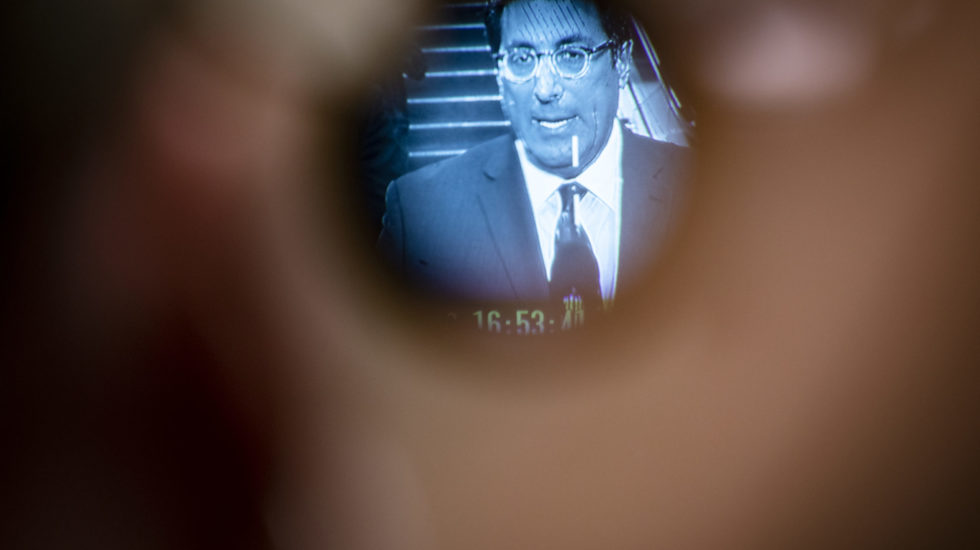Never lie to a judge or jury. Every trial lawyer knows that cardinal rule of advocacy. But in their arguments on Jan. 21, Trump’s lawyers violated it. Repeatedly. With the Chief Justice of the United States Supreme Court presiding and the entire US Senate sitting as judge and jury.
It was only the beginning.
Sekulow
Trump’s personal attorney Jay Sekulow led off.
Lie #1: The House did not afford Trump “due process”: “During the proceedings that took place before the Judiciary Committee, the president was denied the right to cross-examine witnesses, the president was denied the right to access evidence, and the president was denied the right to have counsel present at hearings.”
Truth: House Judiciary Committee Chairman Jerrold Nadler (D-NY) invited Trump to participate in the hearings, even though he had no “due process” obligation to do so. White House counsel Pat Cipollone rejected the invitation in a lengthy screed that concluded, “[W]e do not intend to participate….”
Lie #2: The Mueller report found no collusion and no obstruction: “It came up empty on the issue of collusion with Russia. There was no obstruction. In fact, the Mueller report — to the contrary of what these managers say today — came to the exact opposite conclusions of what they say.”
Truth: Mueller’s charge was limited to investigating crimes, so he expressly excluded any determination about “collusion” because it’s not a legal term. Mueller did find:
- “The Russian government interfered in the 2016 presidential election in sweeping and systematic fashion.”
- “[T]he investigation also identified numerous links between the Russian government and the Trump Campaign.”
- “[T]he Russian government perceived it would benefit from a Trump presidency and worked to secure that outcome, and [] the Campaign expected it would benefit electorally from information stolen and released through Russian efforts.”
As for obstruction, Mueller expressly refused to exonerate Trump, even though Justice Department policy precluded him from indicting a sitting president. But he described 10 episodes of Trump’s possible obstruction and, for many of them, concluded that the evidence was sufficient to prove it.
Cipollone
White House counsel Pat Cipollone is paid by American taxpayers to represent the office of the president, not Trump personally. He and Trump have crossed the line separating those two jobs.
Lie #3: Continuing Sekulow’s theme that Trump did not receive “due process,” Cipollone asserted that Republican members of the House Intelligence Committee were not allowed entry into the secure room where private hearings occurred: “The proceedings took place in a basement of the House of Representatives. … Not even [House intelligence Committee Chairman Adam] Schiff’s Republican colleagues were allowed into the SCIF.”
Truth: Forty-eight Republican members of three House committees — including the Intelligence Committee — were permitted to attend the hearings in the SCIF. Subsequently released transcripts prove that many of those Republicans even questioned witnesses.
Lie #4: US aid to Ukraine was delivered “on time.”
Truth: Congress’ nonpartisan watchdog, the Government Accountability Office, concluded that Trump’s aid freeze broke a law — the Impoundment Control Act.
Trump did not lift the freeze in time to disburse all of it as required by the end of the fiscal year on Sept. 30, requiring Congress to pass an extension of the deadline. “Had that provision not been included, then any unobligated funds as of September 30th would have expired,” according to OMB official Mark Sandy.
This list is not exhaustive.
It Will Get Worse
Outside the Senate chamber on Jan. 22, Sekulow said, “Adam Schiff today talked about quid pro quo. Notice what’s not in the articles of impeachment: allegations or accusations of quid pro quo. That’s because they didn’t exist.” The White House then tweeted a video clip of Sekulow’s nonsense.
CNN’s Jake Tapper was among many who called him out: “That’s Jay Sekulow falsely stating in the articles of impeachment there are no allegations or accusations of quid pro quo.” Tapper continued, “It’s true that the words quid pro quo, ‘this for that,’ do not appear in the articles of impeachment. But they certainly do describe this for that.” Tapper then read from the portion of impeachment article one outlining Trump’s quid pro quo and said, “I am not a lawyer. But does that not describe a quid pro quo to the letter?”
I am a lawyer and yes, Jake, it definitely does.
Trump’s legal team has now an opportunity to infect the proceedings and the body politic with whatever narrative they choose, regardless of its veracity. Unless the Senate votes to call witnesses — as 70 percent of Americans favor — the House impeachment team won’t have an opportunity to respond.
Sometimes the purpose of a lie isn’t to get people to believe it. It’s to get people to doubt everything — including the truth.
Steven J. Harper is a regular contributor to News & Guts and the creator/curator of the Trump-Russia Timeline. He’s an attorney, adjunct professor at Northwestern University Law School, and author of several books, including Crossing Hoffa — A Teamster’s Story and The Lawyer Bubble — A Profession in Crisis. He blogs at The Belly of the Beast. Follow him on Twitter (@StevenJHarper1).
